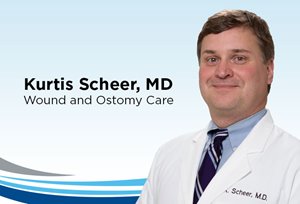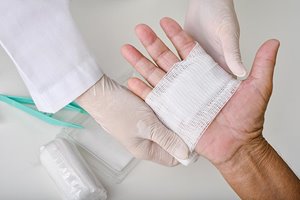 Dr. Kurtis Scheer, a board-certified general surgeon who has been practicing at Door County Medical Center since 1998, is transitioning from General Surgery to Wound Care and Ostomy Care services.
Dr. Kurtis Scheer, a board-certified general surgeon who has been practicing at Door County Medical Center since 1998, is transitioning from General Surgery to Wound Care and Ostomy Care services.
"The life of a general surgeon is very rewarding," Dr. Scheer says, "but also demanding. After practicing for 25 years," he continues, "it was only natural to begin thinking about my plans to ultimately transition into retirement. After reading an article in General Surgery News that discussed wound care," he relates, "a light bulb went off in my mind—wound care is something I not only already have a great deal of experience with, but it is also an aspect of my practice that I have historically enjoyed providing."
What are wound care and ostomy care?
Wound care refers to the management and treatment of injuries or sores that occur on the skin or tissues. A wound specialist is a clinician who has been trained in the treatment of acute, chronic and non-healing wounds. Proper wound care is essential to prevent further damage and promote healing, and can range from simple first-aid to complex medical procedures. Examples of acute wounds include cuts from surgical procedures, animal bites and burns, while examples of chronic wounds include pressure sores and diabetic ulcers.
Ostomy care refers to the management of a surgical opening—called a stoma—made in the abdomen to allow waste to be eliminated from the body in cases where the normal digestive or urinary system is not functioning properly. Ostomy care primarily involves managing and caring for the stoma and the skin surrounding the stoma, as well as ensuring the proper functioning of the ostomy appliance—for example, a colostomy bag—that is attached to the stoma.
Dr. Scheer brings a unique level of expertise to DCMC's Wound Care Center
"One might expect that surgeons have expertise in managing operative incisions and traumatic wounds," he relates, "and in fact, before dedicated wound care clinics evolved, most complex wounds were indeed managed by general surgeons."
 "For many years, comprehensive wound care has been a very big part of my own practice," Dr. Scheer notes, adding, "Now, I will be limiting my practice, procedure-wise, to those that can be performed in the Wound Care Center setting—such as local wound debridement and placement of biologic tissue grafts. However," he continues, "I do plan on continuing to provide interventional treatments for venous disease as it applies to wound care."
"For many years, comprehensive wound care has been a very big part of my own practice," Dr. Scheer notes, adding, "Now, I will be limiting my practice, procedure-wise, to those that can be performed in the Wound Care Center setting—such as local wound debridement and placement of biologic tissue grafts. However," he continues, "I do plan on continuing to provide interventional treatments for venous disease as it applies to wound care."
On his approach to wound care
"The first step in wound care is attempting to figure out how the wound likely occurred and identify any contributing factors," Dr. Scheer explains. "Sometimes this is straightforward," he remarks, "but oftentimes there are a multitude of factors that contribute to the development of a wound and its failure to heal. For example," he continues, "factors that can inhibit the healing process include: acute traumatic injury, pressure injury and surgery, as well as associated medical conditions like diabetes, peripheral arterial disease, edema, venous hypertension, lymphedema, and obesity."
"Treatment does not end once the wound is healed either," Dr. Scheer adds, "ongoing preventative measures are often required to prevent recurrence, with subsequent prescribed treatments then focused on neutralizing or eliminating as many of the contributing factors as possible."
 "It is not uncommon for patients with complex wounds to require extended care," Dr. Scheer says, "and oftentimes," he adds, "these patients have contributing factors that can be managed, but not cured or eliminated. In cases like these," he continues, "the Wound Care Center takes a multidisciplinary approach and attempts to address each patient's individual needs, working closely with our physical and occupational therapists, home medical equipment suppliers, home health nursing agencies, nursing homes, and primary care providers, among others."
"It is not uncommon for patients with complex wounds to require extended care," Dr. Scheer says, "and oftentimes," he adds, "these patients have contributing factors that can be managed, but not cured or eliminated. In cases like these," he continues, "the Wound Care Center takes a multidisciplinary approach and attempts to address each patient's individual needs, working closely with our physical and occupational therapists, home medical equipment suppliers, home health nursing agencies, nursing homes, and primary care providers, among others."
About Dr. Scheer
Dr. Scheer was born and raised in Fargo, North Dakota. He completed his undergraduate studies at Concordia College in Moorhead, Minnesota, and completed his surgical residency at the Medical College of Wisconsin in Milwaukee.
"When I started my undergraduate education," he recalls, "I knew only that I wanted to pursue something in the field of science. While exploring my options," he continues, "I secured a job as an orderly at a local nursing home. This was my first exposure to taking care of patients, and I truly enjoyed it. It was this early employment experience that solidified for me my decision to pursue medicine as a career."
Initially, Dr. Scheer was interested in pursuing family medicine. "But after my first clinical rotation in general surgery as a third-year student," he remarks, "it became clear to me that my destiny was to be a surgeon. In retrospect," he adds, "it seems that I have always enjoyed making things and fixing things—doing things with my hands. I have found both the intellectual and the physical components of being a surgeon to be very appealing."
•
"There is a critical need for expertise in managing complex wounds," Dr. Scheer says. "I enjoy the intellectual challenge of identifying the contributing factors that are preventing patients from making progress in healing their wounds. Professionally," he adds, "it is very satisfying to be able to help the patient who has sometimes been struggling for months to make any progress."
Despite his already extensive experience with wound care, Dr. Scheer is continuing to expand on his prior knowledge and expertise. "There are certain aspects of ideal modern wound care that are relatively new to me," he says, "And so, I am currently studying to become certified by the American Board of Wound Management (ABWM) as a physician Certified Wound Specialist (CWS). "Striving to become truly expert in this field," Dr. Scheer remarks, "has already been very rewarding."